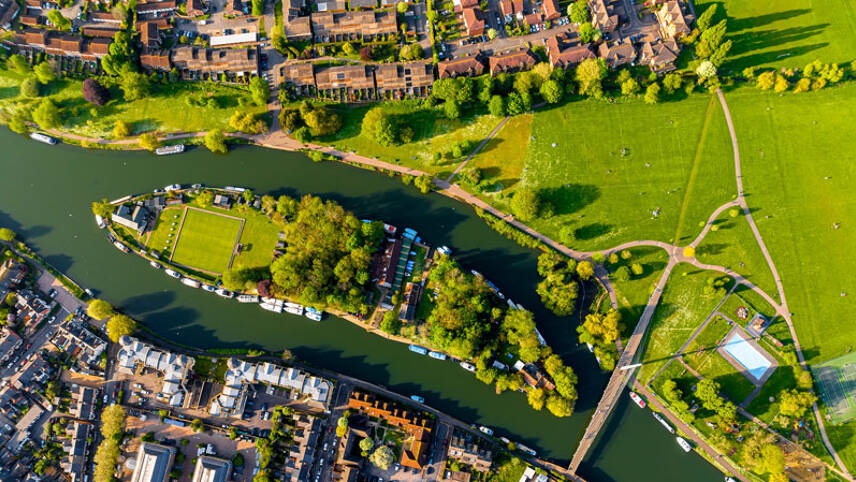Register for free and continue reading
Join our growing army of changemakers and get unlimited access to our premium content

Pictured: Homes and boats in Reading
The Secretary of State for Housing Michael Gove confirmed changes to the Levelling Up Bill today (29 August), in a bid to encourage more housebuilding.
The Government is notably aiming for 300,000 new homes to be created each year from the mid-2020s. However, housebuilding rates in England have continued to slow and are now near the levels seen during World War Two.
Gove, along with Environment Secretary Therese Coffey, has put forward to the Bill that would alter ‘nutrient neutrality’ rules currently placed on developers. Under the rules, implemented by the EU in 2017, developers will need to prove that their work will not cause polluting nitrates and phosphates to seep into nearby water.
If pollution is likely to result from their developments, these businesses will need to invest to intervene. Options include wetland creation or buffer zone development. Since 2022, developers have also been able to buy “credits” from the Government to offset their impact elsewhere within the same catchment.
The rules cover pollution from construction and from the operation of the new houses once complete. They were enacted to protect wetlands and waterways in protected areas.
Housebuilders have long been calling for changes to the nutrient pollution rules. The National Federation of Builders and House Builders Association have argued that the enforcement of the rules has been so strict that some 120,000 new homes have been put on hold in the past five years.
Such trade bodies have also pointed the finger at farmers and water firms, arguing that they contribute to water pollution far more than construction and homes.
It bears noting that extra funding has been confirmed today for nutrient managements on farms. £200m of grants have been unveiled for slurry management and precision spreading equipment. An additional £25m will go to research and innovation on the management of plant and soil nutrients.
Also announced today was an increase in farm inspection rates to ensure that slurry and other nutrient sources are being managed as stated.
The Government had already set a legally binding target to reduce nutrient runoff from agriculture by at least 40% by 2038. This is coupled with a target to halve phosphorus loadings from wastewater by 2028.
A poll of 2,000 UK-based businesses earlier this year revealed that the vast majority are against weakening health, safety and environmental standards as part of a package of retained laws from the EU.
Prime Minister Rishi Sunak has, however, called the nutrient neutrality rules a “hangover” from the EU’s membership to the UK, that are “not right”.
Green economy reaction
Environmental groups have been urging Ministers not to bow to pressure from housebuilders on the nutrient neutrality rules – especially given that ‘sewagegate’ has dented the Conservative Party’s popularity.
There have been questions about how the move could impact social and environmental spending; the Guardian is reporting that costs of £140m could be transferred to the public purse.
Greenpeace UK’s policy director Doug Parr said: “Who would look at our sickly, sewage-infested rivers and conclude that what they need is weaker pollution rules? No one, and that should include our Government.
“Instead of allowing housebuilders to cut corners, the Sunak administration should make sure we have the right infrastructure to handle our sewage so we can build new homes without sacrificing our rivers’ health. But that would require them to do what they’ve spectacularly failed to do so far – forcing water firms and housebuilders to invest their profits in upgrading treatment plants and pipes to a standard that a modern, functional country would expect.”
Wildlife Trusts chief executive Craig Bennett accused the Government of “disgusting behaviour” in an interview on BBC Radio 4 Today.
Bennett said the rules were already “very modest” and that, by weakening them, the Government is letting businesses “wriggle out of environmental commitments”. Similar arguments have been put forward by think-tank Green Alliance.
RSPB’s director of conservation Katie-Jo Luxton said the changes could undermine the Conservative Government’s commitment to leave nature in a better state for the next generation.
She said: “If nutrient neutrality rules are scrapped, pollution will accumulate unchecked and our rivers face total ecological collapse.”
The Government has stated that the additional nutrients attributable to up to 100,000 new homes would be “very small” and is drawing up plans to offset this impact by restoring habitats in protected areas.
The Office for Environmental Protection, the UK’s post-Brexit watchdog, had told Ministers that the changes would “demonstrably reduce the level of environmental protection provided for in existing environmental law. They are a regression”.
The watchdog has also voiced concerns that the Government has not been transparent on how the new funding will ensure that England still meets its objectives on water quality and conserving protected sites.


Please login or Register to leave a comment.